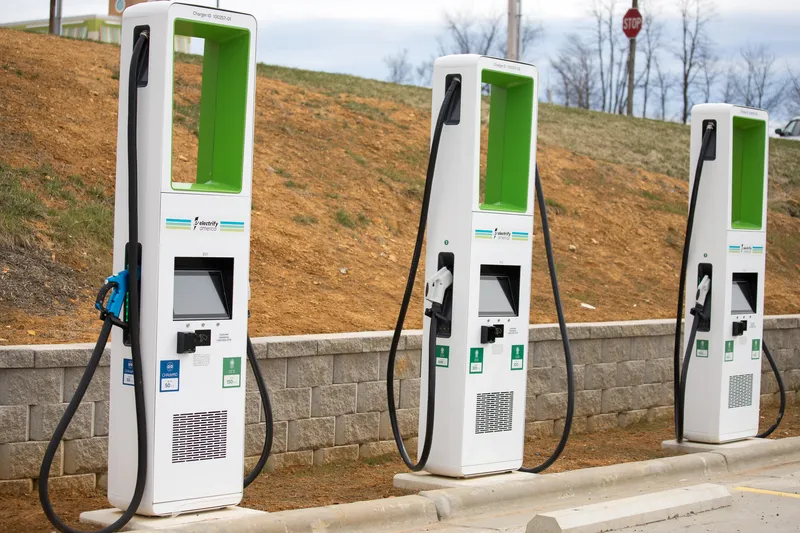Most battery and plug-in hybrid electric vehicle (PHEV) manufacturers in Europe and the US have been adopting onboard chargers with a power output between 3 to 3.7 kilowatts (kW), according to new analysis from Frost & Sullivan.
Now, EV manufacturers are moving towards onboard chargers with a power output greater than 6.6 kW to reduce charging time. While high-end PHEVs are contributing to this trend, lower-end models in this segment are still using 3.7 kW onboard chargers. Consequently, onboard chargers
May 6, 2015
Read time: 3 mins
Most battery and plug-in hybrid electric vehicle (PHEV) manufacturers in Europe and the US have been adopting onboard chargers with a power output between 3 to 3.7 kilowatts (kW), according to new analysis from 2097 Frost & Sullivan.
Now, EV manufacturers are moving towards onboard chargers with a power output greater than 6.6 kW to reduce charging time. While high-end PHEVs are contributing to this trend, lower-end models in this segment are still using 3.7 kW onboard chargers. Consequently, onboard chargers with power ratings between 3 to 3.7 kW are expected to remain dominant, accounting for 62 per cent of sales even in 2020.
The analysis, Strategic Analysis of the US and European Onboard Chargers Market, finds that sale volumes of onboard chargers stood at 304,683 units in 2014 and estimates this to reach 2,235,937 units in 2020.
More than 15 major companies supply onboard chargers globally, with Lear Corporation and598 Panasonic in key positions as suppliers for 1960 Chevrolet Volt and Nissan Leaf – the top-selling EVs in Europe and North America. All these companies offer isolated chargers and many, including Brusa and Panasonic, are investing in R&D to introduce non-isolated chargers.
"Currently, over 60 per cent of components required to make onboard chargers are being outsourced due to high in-house manufacturing costs," said Frost & Sullivan Automotive & Transportation senior research analyst Prajyot Sathe. "Tier I suppliers in Europe and the US have mainly been sourcing components such as electromagnetic interference filters, power factor controllers (PFCs), and direct current (DC)-DC converters from tier II suppliers."
While most suppliers have the expertise to manufacture components in-house, they have refrained from doing so due to low demand for onboard chargers. Suppliers must, however, begin to manufacture DC-DC converters and PFCs themselves, as these components account for the maximum cost of onboard chargers and contribute to higher prices.
"To cope with the current scenario, major vehicle original equipment manufacturers (OEMs) such as2069 Daimler are expected to adopt the component sharing strategy, which will drive production volumes and reduce the cost of components," noted Sathe. "Another strategy vehicle OEMs could consider is entering strategic alliances to pool the technical expertise of partners and decrease manufacturing costs."
By way of high-volume manufacturing and strategic partnerships, onboard charger suppliers in Europe and the US will be able to lower the price of their products. While the current price of an onboard charger ranges from US$130 to us$230 per kW, prices are likely to fall by 20 to 25 per cent within 2020.
Now, EV manufacturers are moving towards onboard chargers with a power output greater than 6.6 kW to reduce charging time. While high-end PHEVs are contributing to this trend, lower-end models in this segment are still using 3.7 kW onboard chargers. Consequently, onboard chargers with power ratings between 3 to 3.7 kW are expected to remain dominant, accounting for 62 per cent of sales even in 2020.
The analysis, Strategic Analysis of the US and European Onboard Chargers Market, finds that sale volumes of onboard chargers stood at 304,683 units in 2014 and estimates this to reach 2,235,937 units in 2020.
More than 15 major companies supply onboard chargers globally, with Lear Corporation and
"Currently, over 60 per cent of components required to make onboard chargers are being outsourced due to high in-house manufacturing costs," said Frost & Sullivan Automotive & Transportation senior research analyst Prajyot Sathe. "Tier I suppliers in Europe and the US have mainly been sourcing components such as electromagnetic interference filters, power factor controllers (PFCs), and direct current (DC)-DC converters from tier II suppliers."
While most suppliers have the expertise to manufacture components in-house, they have refrained from doing so due to low demand for onboard chargers. Suppliers must, however, begin to manufacture DC-DC converters and PFCs themselves, as these components account for the maximum cost of onboard chargers and contribute to higher prices.
"To cope with the current scenario, major vehicle original equipment manufacturers (OEMs) such as
By way of high-volume manufacturing and strategic partnerships, onboard charger suppliers in Europe and the US will be able to lower the price of their products. While the current price of an onboard charger ranges from US$130 to us$230 per kW, prices are likely to fall by 20 to 25 per cent within 2020.









